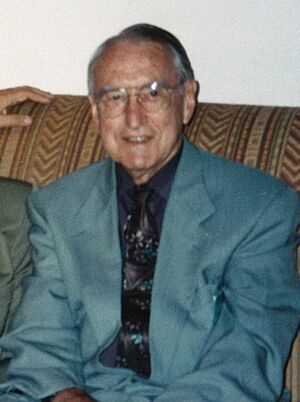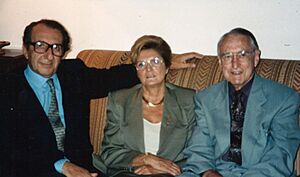John Money facts for kids
Quick facts for kids
John Money
|
|
|---|---|

Money in 1996
|
|
| Born |
John William Money
8 July 1921 Morrinsville, New Zealand
|
| Died | 7 July 2006 (aged 84) Towson, Maryland, U.S.
|
| Alma mater | Victoria University of Wellington Harvard University |
| Awards | James McKeen Cattell Fellow Award (1992) |
| Scientific career | |
| Fields | Psychology |
| Institutions | Johns Hopkins University |
John William Money (born July 8, 1921 – died July 7, 2006) was a New Zealand American psychologist. He was also a professor at Johns Hopkins University.
Money is known for creating the terms gender role and sexual orientation. However, he did not create the term gender identity, even though many people think he did.
Since the 1990s, some of Money's work has been looked at very closely by experts and the public. A study in 1997 criticized parts of his research. This included his work with a child named David Reimer.
Money wrote many articles, books, and reviews, about 2,000 in total. His writings have been translated into many languages. He also received about 65 awards and honors during his life.
Early life and education
John Money was born in Morrinsville, New Zealand. His family was very religious, belonging to the Plymouth Brethren Christian Church.
He went to Hutt Valley High School. Later, he studied psychology at Victoria University of Wellington. He earned two master's degrees in psychology and education in 1944. After that, he worked as a junior psychology teacher at the University of Otago in Dunedin.
In 1947, when he was 26, Money moved to the United States. He studied at the Psychiatric Institute of the University of Pittsburgh. He then earned his PhD from Harvard University in 1952.
Career and ideas
In 1952, Money started working at Johns Hopkins University. He became a professor of pediatrics (children's medicine) and medical psychology. He worked there until he passed away.
Money developed several ideas about gender identity and gender roles. He was the first to use the term 'gender role'. This term describes how society expects people to act based on their gender.
In the early 1960s, he wrote papers with Richard Green. These papers looked at how young boys expressed their gender.
Gender identity clinic
Money was very interested in gender identity. He believed that some people who felt their gender did not match their body had a strong, fixed idea about it.
In 1965, Money helped start the Gender Identity Clinic at Johns Hopkins. He worked with an expert named Claude Migeon. This clinic was the first in the United States to offer certain medical procedures for gender transition, starting in 1966. Money would observe adult patients for two years before they could have these procedures.
Personal life
John Money lived in a house in Baltimore for over 40 years. It was close to the Johns Hopkins medical campus. He enjoyed collecting art from his travels. This included art from Aboriginal communities in Australia.
Money also supported many famous artists early in their careers. These included New Zealand artists Rita Angus and Theo Schoon. He also knew the American artist Lowell Blair Nesbitt. Money was even acquainted with Yoko Ono.
In 2002, Money donated a large part of his art collection. He gave it to the Eastern Southland Art Gallery in Gore, New Zealand. In 2003, the Prime Minister of New Zealand, Helen Clark, opened a special section at the gallery named after John Money.
Money passed away on July 7, 2006. He was one day shy of his 85th birthday. He died in Towson, Maryland, due to problems from Parkinson's disease.


